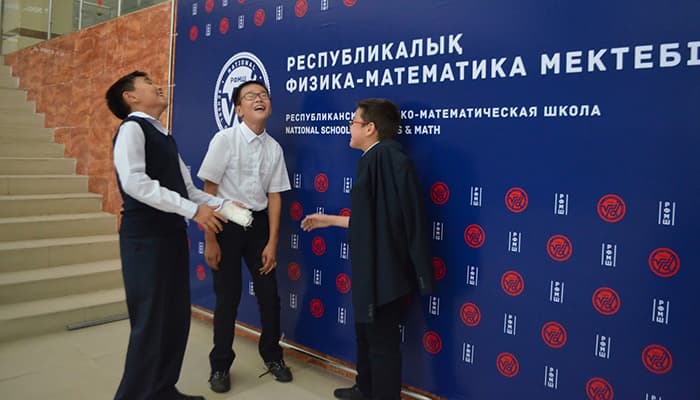In Soviet Union, at the turn of 1960-70 of the last century, special attention was paid to the preparation of technical specialists. They were required in view of the active development of science and space exploration. Prominent mathematician Orymbek Zhautykov realized the need to develop a school of physics and mathematics education in Kazakhstan. Thanks to his perseverance, the Republican Physics and Mathematics School was opened in Alma-Ata in 1972.
The RPMS gave fundamental secondary education in the exact sciences, allow graduates to enter the best universities of USSR. Many students later became members of the political and business elite of Kazakhstan. Among them – Karim Massimov, Timur Kulibayev, Kayrat Kelimbetov, Nurlan Kapparov, Erbolat Dossaev, Berik Kaniev, Vyacheslav Kim, Daniyar Erenchinov, Bakhyt Sultanov, Kayrat Kozhamzharov, Erlan Sagadiyev, Daniyar Abulgazin and others.
RPMS students have always been close-knit and friendly with each other. So when a graduate of 1987 Nurlan Kapparov had the idea of creating an alumni fund, he was instantly supported by others. They pooled some money and financed equipping classrooms, gyms, dormitories (RPMS has a boarding school). They brought back a number of strong teachers who had taught them before. All of this was to keep the spirit of the school and return it to its former glory. And despite the fact that Nurlan Kapparov untimely passed away in 2015, the graduates continue to participate in school life. Now in his memory.
The money collected by well-known graduates – about $ 2 million – allowed to increase salaries for teachers, to support the Olympic movement among students, to launch an exchange program which allows students travel to the United States. The work went so well that in 2008, devotees decided to go ahead and set up the school’s Board of Trustees, which included 24 participants. In 2014, Karim Massimov was elected as Chairman of the Board.
Trustees understood that change was needed to modernize the physics and mathematics school. “It was clear that the challenges of our time require reforms in the curriculum – says Head of Lancaster Group Berik Kaniev. – Some non-major subjects could be made elective and free time could be used for in-depth study of physics and mathematics, English, information technology, i.e. subjects, the knowledge of which is particularly necessary today. ”
The Board of Trustees realized that the reforms could not be limited to financial support and changes in the curriculum – it was necessary to change the principles of school management itself. To implement the plan, it was decided to change the form of its ownership from the Republican State Enterprise (RSE) into the Non-commercial JSC. This allowed to make the curriculum more flexible and the decision-making process more efficient. A full-fledged Board of Directors was created within the framework of the Non-commercial JSC. It works according to the principles of corporate governance: the meetings are held three times a year where Director of the institution submits their reports. The Board of Directors includes representatives of government, the autonomous organization of education “Nazarbayev Intellectual Schools” (NIS), businessmen and teachers. In addition, the RPMS began to measure training effectiveness using the KPIs. Among the options – assessment of UNT, international exams TOEFL, IELTS, SAT, the number of graduates admitted to the best universities.
Half of the shares of the school converted into the Non-commercial JSC the BOD decided to transfer to the system of “Nazarbayev Intellectual Schools”. According to Kaniyev, this way RPMS adopted the NIS experience in the field of academic freedom, trilingualism, and applied subjects. At the same time the physics and mathematics school has preserved its traditions of teaching the traditional sciences.
All these changes have become first of its kind in Kazakhstan. Kaniyev hopes that this is only the beginning. “We would like our experience to spread to other Kazakhstan institutions, – he says. – Among the alumni of any school or university there are certainly successful and caring people who could help their alma mater. Any support is important, not only financial.”
Graduates of RPMS provide assistance in different ways. For example, Head of Kaspi Bank Vyacheslav Kim provided support creating the school’s brand mark, which corresponds to the best world standards. In addition, graduates are planning to create an endowment fund.
But the main news of this year was the opening of the RPMS branch in Astana. The new institution was the result of the support of the graduates and cooperation with the NIS. The school was launched in a short time despite the long waiting. The decision was made in June, and the first academic year started in September.
Gabit Bekakhmetov, a graduate of prestigious Duke University with extensive experience in education, was appointed as Director of the school. Teachers were searched and recruited from all over Kazakhstan. As a result, a strong and proactive team was created which began to introduce innovations in the educational process. From fifth grade students learn programming languages and master the skills of critical thinking. As part of Astana RPMS, there is even an edutainment center studying the educational component in different games. All of this contributed to the rapid increase in the school’s popularity. As a result of the competition 884 student were enrolled in classes from first to the 10th. 200 of them are studying on grants.
The Board of Directors of RPMS has a lot of plans. According to Adviser to the Chairman of Committee of the Board of Trustees Bakhyt Ospanov, the school has everything for continuous improvement. He, like Berik Kaniyev, believes that the experience of alumni participation in the life of the physics and mathematics school can serve as an example for all schools in Kazakhstan.

